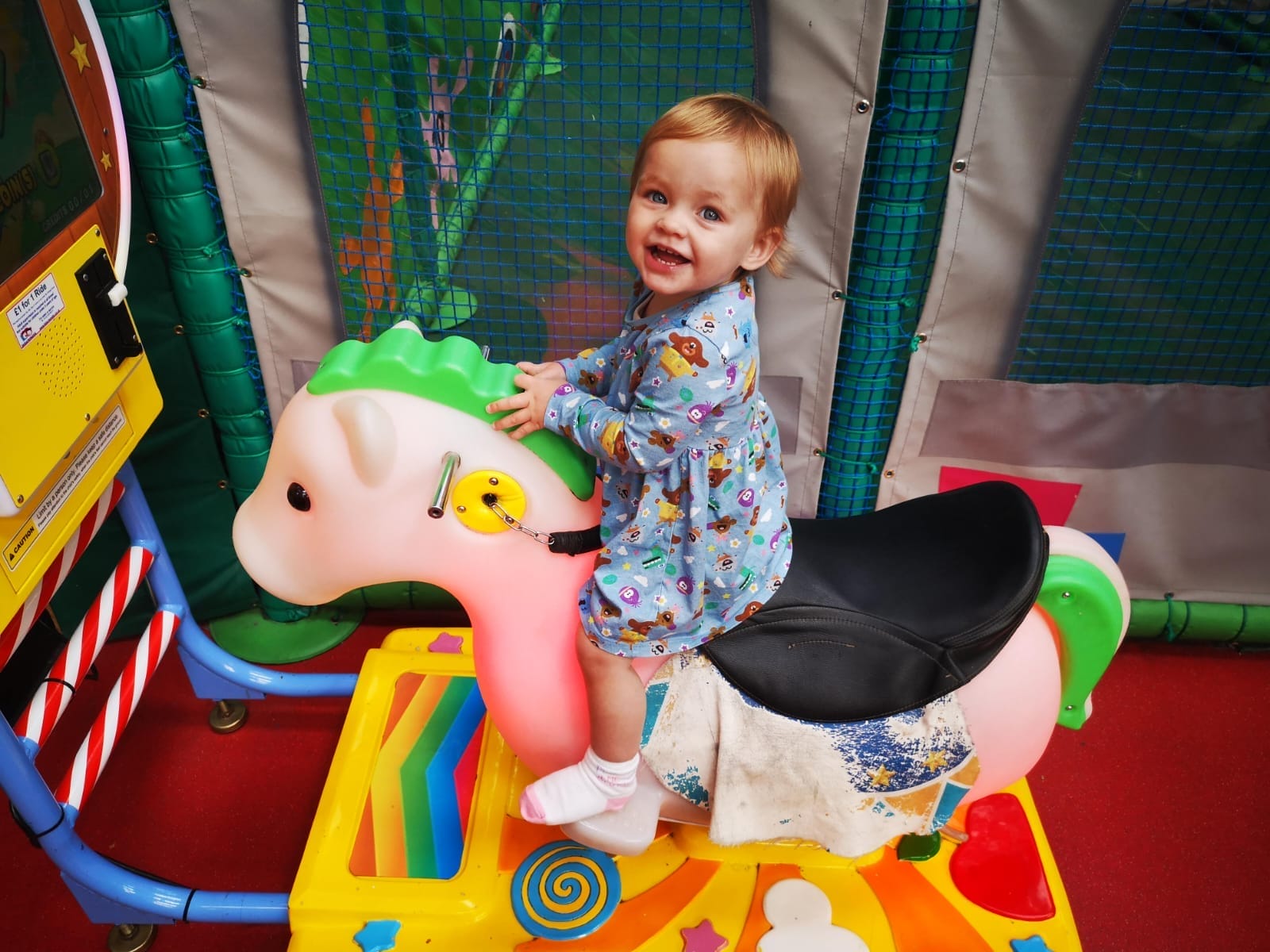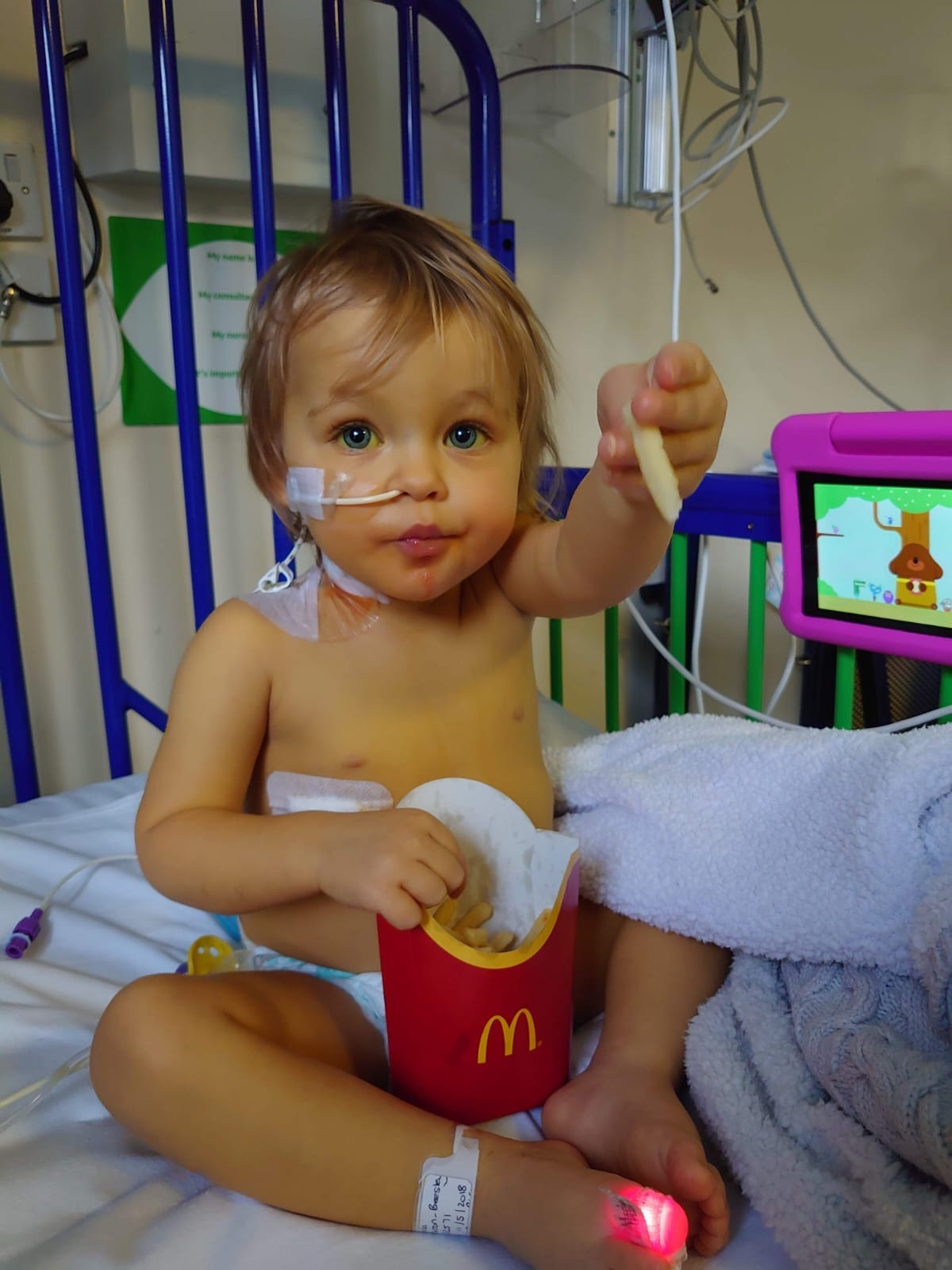A NETWORK OF TRUST

When Sarah Stockton-Beesley’s daughter Isabella, now seven, was 16 months old, she suddenly became very unwell. “Isabella had been a really healthy baby but was suddenly vomiting morning, noon and night. I didn’t seek medical help for two weeks, thinking it might have been a virus, but the vomiting didn’t stop.”
In October 2019, Sarah took Isabella to A&E. “I ended up taking her to three different ones as they kept telling us it was just a virus, but I knew it wasn’t normal. On our third visit, they decided to do investigations – and we ended up staying in the hospital for a month.” On 28 October, Isabella was given blood tests that showed elevated liver enzymes.
“We were told the doctors were in talks with Birmingham Children’s Hospital, which has one of the top liver units in the country, then they said there was a bed for her there. They didn’t give us much information but I knew something was very wrong.”
On 9 November we were told a biopsy had shown she was very unwell. To our horror, they told us Isabella had acute liver failure and wasn’t going to recover without a new liver, so they were listing her on the super-urgent transplant list. I felt so shocked and confused.
“Normally when you have a transplant, you go for an assessment where they explain to you exactly what will happen, but they basically had to give us a whistle-stop tour with a photo album to show us what ICU looks like and what Isabella would look like afterwards. We didn’t feel very prepared.” Over the next week, Isabella was offered three different livers, but none were a suitable match.

She had become very unwell at this point. was given lots of different medications. “During her week on the transplant list she developed encephalitis, inflammation of her brain caused by a buildup of toxins. Her behaviour changed dramatically and she became so agitated she was banging her head on the cot side and wouldn’t settle. On 15 November, the doctors put her in an induced coma because her brain couldn’t take it, and they put her on a filtration system to filter out the toxins from her blood.” Two days later, Isabella was given her transplant. “They didn’t tell us at the time but if she hadn’t had the ransplant then, everything else would have started shutting down.
“After the transplant she was also put on immunosuppressant medication so her body didn’t reject the liver. This comes with a big risk, especially when you’re an active and curious toddler going to preschool and attempting to have a normal life. As Isabella’s got older, she is very aware of her own risks and things she needs to avoid, including certain types of food, but the risk will never go away and it still very much affects our lives.”
In 2023, Sarah contacted British Liver Trust for help with a riskassessment for Isabella’s school. “I had previously heard of the charity through the hospital, where we were given us lots of its information packs, which were so helpful. Then, after Isabella started school, we wanted to find the right risk assessment for her, so I got in touch with the charity and asked if they could help us with this. They agreed to attend meetings and offered to do in-house training for the staff, and they helped us to put a risk assessment in place that covered things such as teachers not working with Isabella if they had a cold sore, unless they were wearing a mask.
“It was extremely helpful, as I’ve got to make sure Isabella’s safe every minute of every day – that she’s not picking stuff up or putting stuff in her mouth – and I worry when she’s not with me because other people don’t watch her like I do. The risk assessment has given me some peace of mind when she’s away from me that she’s being kept as safe as possible.”
In June 2024, Sarah and her family went on a ten-day holiday abroad and Isabella got rotavirus mid- flight, which left her very unwell and in and out of hospital for the entire trip. “The charity heard what happened and gave us some money towards a day out for Isabella. We took her to watch Matilda the Musical for the five-year anniversary of her transplant in November and she loved it. It was such a lovely thing for them to do.”
Since then, Sarah has continued to use the charity’s resources. “We get emails every month keeping us up to date, and there are groups Isabella can join when she’s older, as well as groups for siblings, which I think will be really beneficial. There’s no other charity out there like it and the information it provides on liver disease and the after-effects is invaluable, as there’s a lot of misunderstanding that you have a transplant and you’re cured,but there are still things that affect children like Isabella every day.
“Also, it doesn’t just affect the person having the transplant; it affects siblings and everyone around you. It’s been difficult for our older children – who are now 12 and 10 – as I can go out in the middle of the night to hospital and be gone for days. It’s good to know the charity is always there at the end of an email or phone. The support it gives is hard to put into words – it’s like you’ve always got someone fighting your corner and you feel like part of a family.”
THE CANDIS BIG GIVE AMOUNT RAISED: £81,428
- British Liver Trust achieves real change in liver health by increasing awareness of all types of liver disease, providing information and support, working with healthcare professionals and campaigning for change to improve diagnosis, treatment and care.
- Money raised in the Candis Big Give will go towards reducing stress and isolation for parents, children and young people affected by childhood liver disease by delivering emotional and practical support. Funds will help the charity continue to provide face-to-face, phone, email and online support for those impacted by a diagnosis of rare childhood liver disease.
- The charity helps families deal with things like their financial situation, their emotional health and wellbeing. It also speaks to family members of the affected child and can help siblings to understand what’s happening.
- It works with clinicians to ensure all information on its website, in leaflets and in person is medically correct.
- It also offers support when a child starts school, helping to make sure the school understands what it’s like to have a child with a liver transplant and to make sure there are things in place for them.
- Visit britishlivertrust.org.uk
WOULD YOU LIKE TO HELP IN SUPPORTING HEALTH CHARITIES
Your gift subscription will help to support health charities
SUBSCRIBE